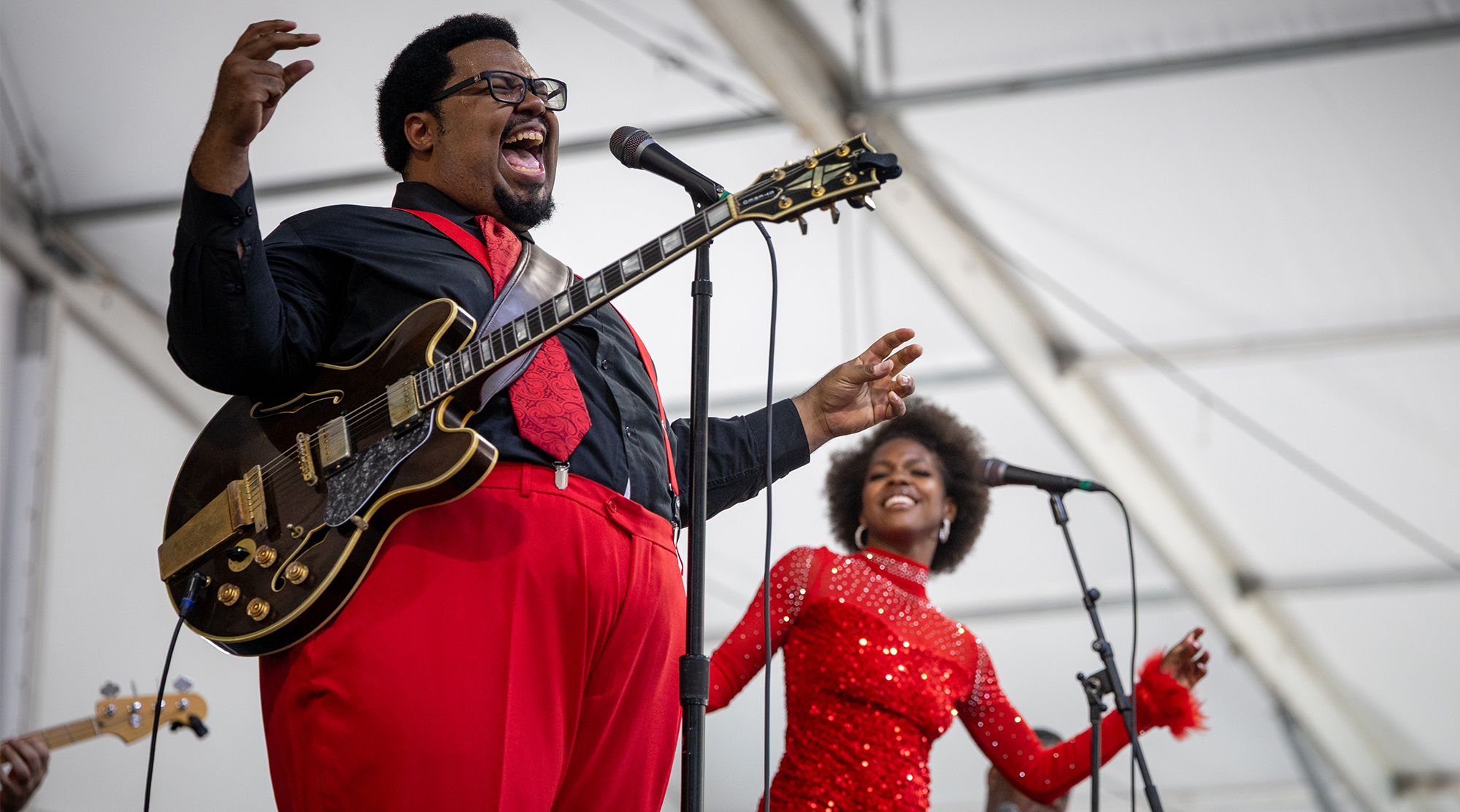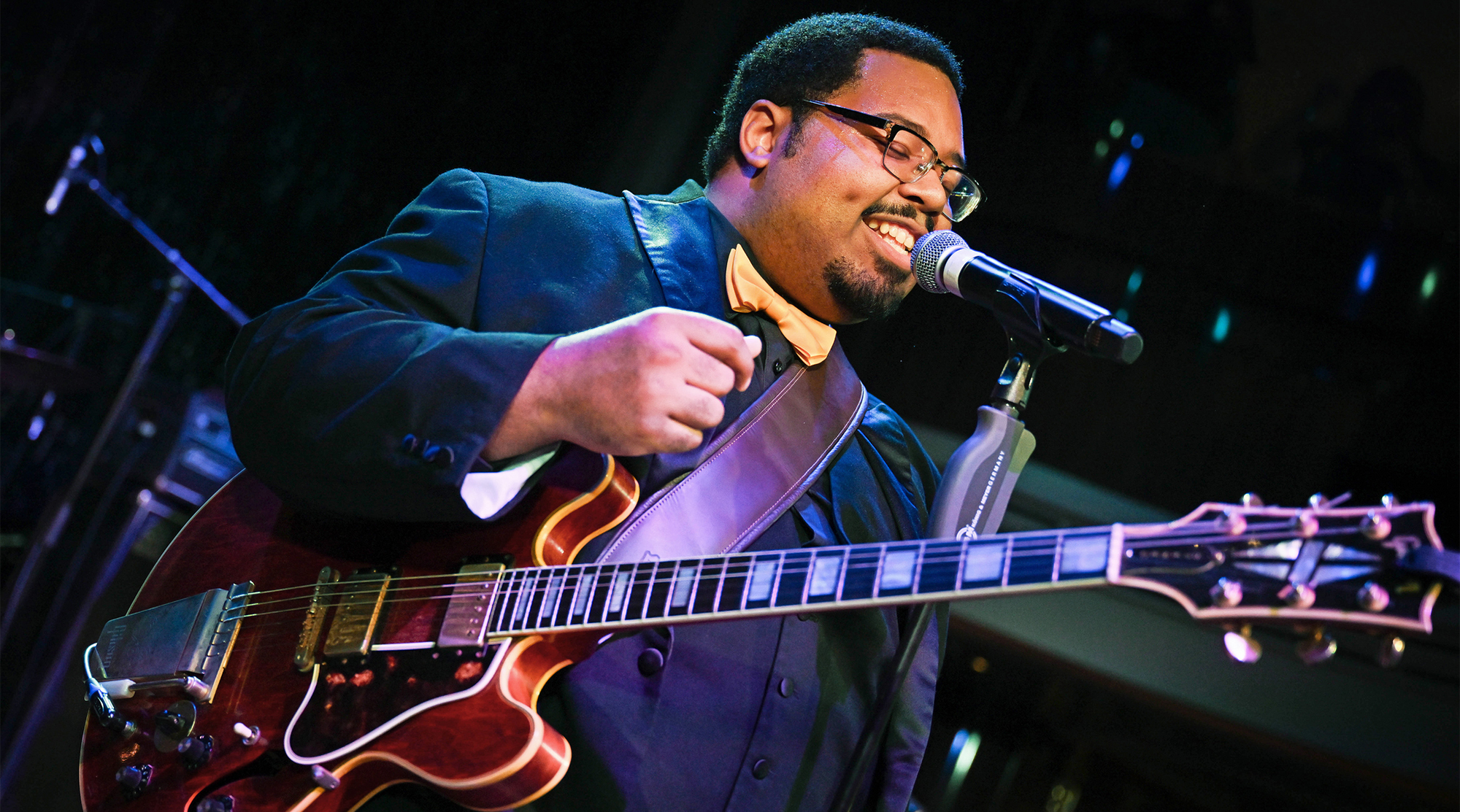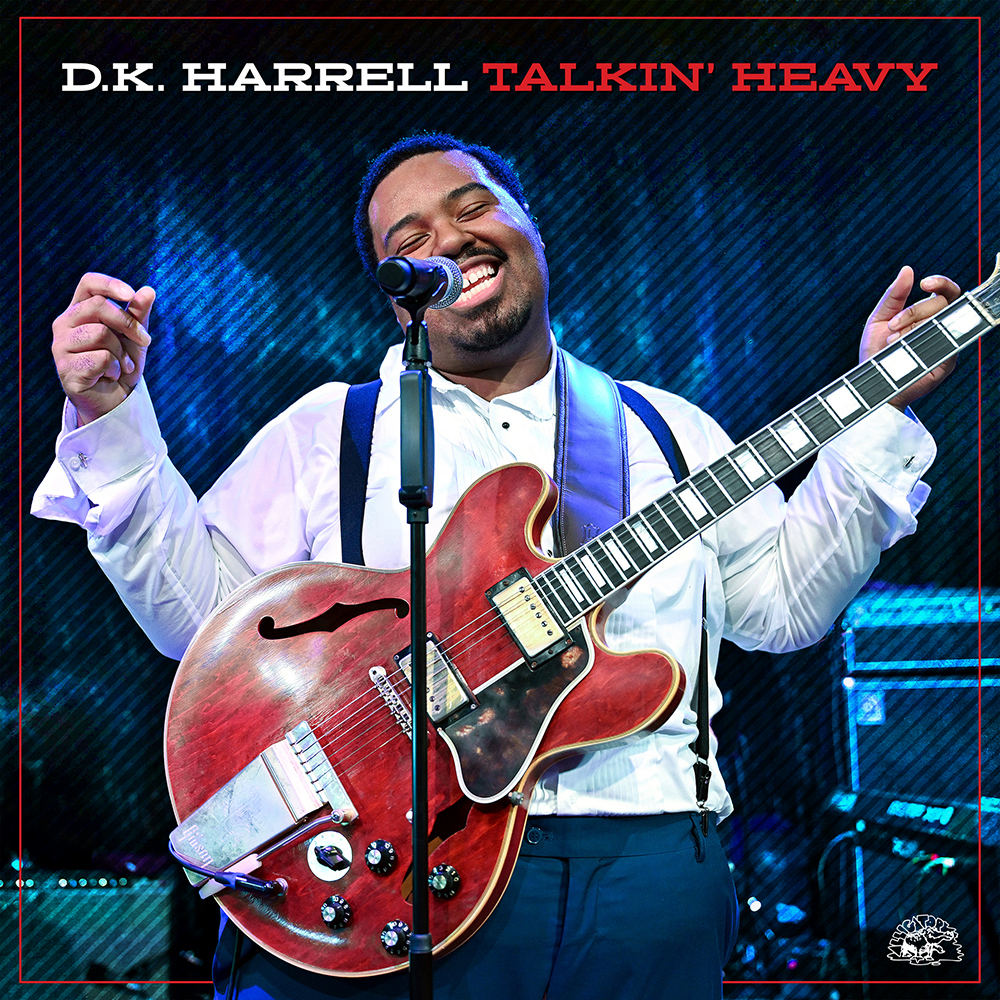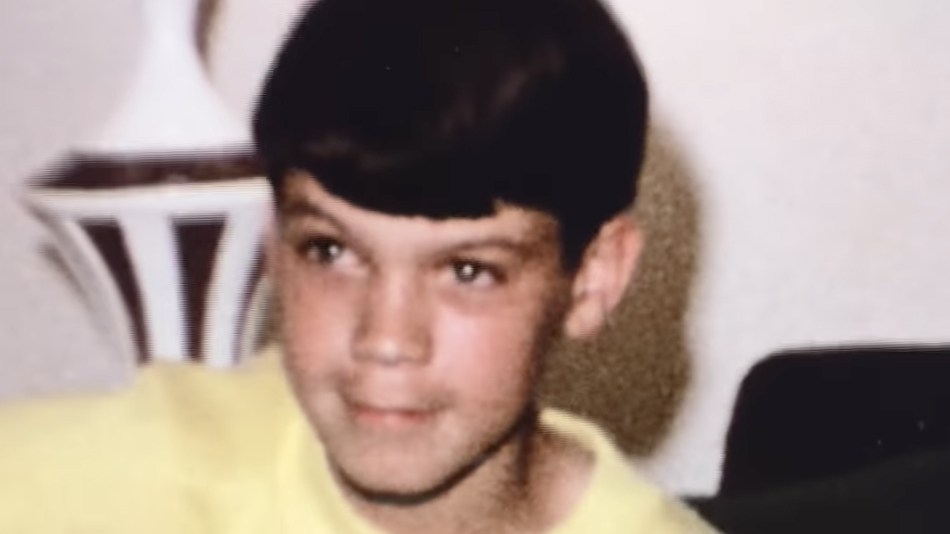
Before speaking with D.K. Harrell, we asked Joe Bonamassa if he had any thoughts he’d like to share on the fast-rising blues star. And indeed, he did. Via email, Bonamassa wrote:
"When I first heard D.K. Harrell, it brought me back to the best of those Alligator, Black Top and Bullseye 1980s blues labels," Bonamassa tells Guitar Player. "The likes of Lonnie Brooks, Albert Collins, Z.Z. Hill — all those great '80s blues artists who had a powerful combination of modern production, great songs, a great voice and great guitar playing. It's nice to see a young man embracing that era of blues.
“Our generation, even as we grew up on the blues of the '40s, '50s and '60s, saw the '80s as a really important chapter," the blues virtuoso continues. "People like Chris Kane, and the stuff B.B. King and Earl King were doing – so many great artists. D.K. Harrell is right up there with some of the greats, and I love that he's embracing that '80s blues influence, which is such a forgotten era of great music in the genre."
All of which left Harrell more or less verklempt.
“I'm shocked,” he says after taking a few seconds to absorb Bonamassa’s praise. “Honest, I'm very shocked, because for one, I didn't know Mr. Bonamassa even heard about me. He’s such a pillar of a musician and guitarist, when it comes to blues itself, and he’s such a great entertainer. I’m lost for words.”
He laughs, then says, “Hearing all that makes me even more nervous now to go on the blues cruise next year. I thank him kindly, and I'll make sure to thank him personally for the kind words.”
No doubt the two guitarists will have much to talk about, and B.B King is bound to be among the topics they’ll discuss. One doesn’t have to be a forensic scientist to spot King’s influence on Harrell: It’s there in his emotive vibrato and his economical phrasing (those single-note bends can last for days). It’s even there in his cool, classy stage presence — the Gibson ES-355 and the tasteful choice of suits call to mind a youthful B.B.
All the latest guitar news, interviews, lessons, reviews, deals and more, direct to your inbox!
When I first heard D.K. Harrell, it brought me back to the best of those Alligator, Black Top and Bullseye 1980s blues labels."
— Joe Bonamassa
Harrell takes on the matter directly. “I am heavy, and yes, I’m heavily influenced by B.B. King,” he says. He recalls his one and only time meeting the blues legend during a concert. “I was 15 or 16, and I went up to the stage and screamed, ‘Mr. King! Mr. King!’ he says. “My hair was in a pompadour at the time, and I said, ‘I have my hair just like you in 1955! I want to be just like you when I grow up!’
“B.B. just laughed and said, ‘The old man has made some mistakes, but maybe I've done some things right. I want you to be the best you can be, and if you're going to be like me, that's okay. Always remember to be yourself while doing so.’ I said, ‘Okay.’”
Harrell’s debut album, 2023’s The Right Man, signaled the emergence of a promising young blues talent, and his upcoming follow-up, Talkin’ Heavy (his first for Alligator Records), is a major step forward. Containing all self-penned cuts such as the stomping lead single “Grown Now,” it’s the joyous sound of a one-man revival. Harrell’s vocals are smooth yet forceful, and his authoritative guitar work — stinging and soulful leads that serve as memorable songs within songs — hits the sweet spot every time.
“I want to grab people and make them feel good,” he says. “I think I’m growing as a lyricist, too. Blues songs don’t have to be sad to resonate.”
You’re okay with being called a traditionalist?
Sure, or a purist. I did a show this past weekend and a good friend of mine said, “D.K., the difference between you and several other contemporary blues artists is that you're a blues purist.” He said, “You care about that old sound that nobody's doing anymore unless they cover a song.”
I think that’s true. In my opinion, Taj Mahal and Keb’ Mo’ and Bobby Rush and Buddy Guy are probably the only four I can name who are purists in the same way.
Have you encountered people who have called you a B.B. King clone?
Oh, of course. Here’s how I see it: Sam Cooke influenced two popular singers of color — Lou Rawls and Johnny Taylor. Then you have Mike Tyson, who looked up to Ali. We all have someone who influenced us. It’s not about wanting to be exactly like the person, but we want to be able to deliver what that person delivered in life. I’ve been called a B.B. King clone, a B.B. King copycat. I’m very proud of it.
You do wear it right on your sleeve.
I’m proud of it, yes.
And then there’s the matter of the kind of guitar you play…
It's a Gibson ES-355 TDSV, with the Varitone switch, so it’s not exactly the same guitar as Lucille.
In way ways did B.B.’s vibrato and his economy of style rub off on you?
Oh, it helps you cheat. You work smarter, not harder. And it’s been a big help. I can play a little bit of rhythm guitar. And I can’t lie: Because I’d had my nerve issue, my muscle memory has been affected a great deal.

Can you talk a bit about the nerve issue?
On February 28 of 2022, I woke up with pins and needles in my left hand. I went to work and thought it would go away, but it didn’t. I went to a clinic and they told me I was having a heart attack. Another doctor told me I was having a stroke, and then the third doctor did an X-ray and told me I had cervical radiculopathy, which is a pinched nerve in the neck.
Usually it can be decompressed through physical therapy, or you can have surgery. I didn’t want surgery, so I tried acupuncture. Didn't like that. I went to a chiropractor for months in 2022, but because of my slow performance at work, they put me on disability for a while. I couldn’t pay my bills and resigned from that job. I struggled to find another job and wound up homeless. I lived in my car. I've slept on floors of family members until they kicked me out. It’s been hard.
All I’m saying is, this style of playing has made it easier for me. On the outside, I might look like everything is okay — I’m playing the single-note phrases or doing vibrato — but I do have to struggle sometimes. I have days when it feels like all the blood has rushed to my fingers. If feels like they’re puffy and swollen, but they’re not. It’s a weird feeling that I have problems describing to people.

You seem so natural when you play. Was the guitar always a struggle?
It was a struggle when I was a teenager in that I got cocky. You start thinking that you know everything and like that. I'll be honest with you: I didn't learn how to tune a guitar until I was 16. I left the guitar alone for a couple of years because I kept popping strings and breaking them. I didn’t know anything about tuning.
When I turned 16, I decided to give it one more shot. I took the time to learn, and I learned how to tune. Then I continued to study videos of B.B. King. I watched everything I could find of him from 1968 to 2014. I liked his approach. I think playing chords is cool and nice — they come in handy when needed.
At the same time, it takes a collection of single notes to make up a chord, so if I play one note of that chord or one note that's in that chord progression, I'm still playing the chord. I'm just doing it as one note.
A few years ago, you did an interview in which you said that modern blues was being “overpowered by distortion and gain.” Do you still feel that way?
To an extent, yes. I’m not downing people who play rock or blues rock, but I wish the people would show their appreciation by going back to the blues. I know Joe Bonamassa may have distortion on his guitar, but he'll play songs like “Born Under a Bad Sign” or “Crosscut Saw” or “Killing Floor,” which I feel pays homage to traditional blues or the blues purists.
If you're just shredding onstage for 15 minutes, it makes me go, Well, I get you. I understand you're talented and you can play a million things, but right now we're not even having a conversation. I can't feel what you're saying because you're not coming up for air.
Of course, Hendrix was rooted in the blues, which he took into the cosmos with distortion and feedback.
If you listen to some of those old bootleg recordings of Hendrix live, he’s really playing the blues. It’s him going back home to where he started and what pleased his ear. In a sense, he was paying homage to the ones who came before him. That recording of Hendrix and B.B. at the Generation Club in New York? That alone is proof. Everybody knows Hendrix setting his guitar on fire, but the way I want to know him is when he played acoustic in that white room. He’s just playing the blues.
I’m not downing people who play rock or blues rock, but I wish the people would show their appreciation by going back to the blues."
— D.K. Harrell
What are your thoughts on Stevie Ray Vaughan?
It’s funny that you brought up the B.B. King clone thing, because there are so many young white guitarists who dress like Stevie Ray. They try to play like Stevie Ray, they try to sing like Stevie Ray, and nobody says a word. But I come out and do one B.B. King song, and it’s like, “Oh, he’s a copycat.”
I’ve thought about this, and I think it’s envy. I can’t lie — a B.B. style is difficult because it’s about timing. It’s feeling and phrasing. There’s a lot going on mentally: “Should I play here? No, no, no, I shouldn’t play anything.” Or maybe it’s “I’m going to say something, but I’m going to think about it first.”
People love living life fast, but you know what they say: “Fast money ain’t always good money.” When you take your time and work at something, then you appreciate it.
In addition to Joe Bonamassa, what other blues contemporaries do you admire?
Gary Clark Jr. In my opinion, he’s taken the style of timing and incorporated it into his own music. When he did “This Land,” he’s not doing much, but it’s a great song. He’s not doing much on “Bright Lights,” either, but it’s a great song. I enjoy Gary a lot.
Even though she’s not a guitar player, Shemekia Copeland is great — great messages, great songs. And, of course, Tedeschi Trucks — love them. I’m good friends with them. I’ve shared a stage with Susan twice, and each time she was fine just playing rhythm.
I commend those artists because they know what it’s about. They know it’s not about flash. It’s about getting your point across and telling your story.
Okay, lightning round: What’s the best gig you ever played?
That’s easy: the Bilbao Blues Festival. I got to meet one of my idols, Martha High, who was a backup singer for James Brown. She was watching my show from the wings, and I was like, “I gotta bring Martha up.” Just for that reason, it was maybe the best show.
All right, now the flipside: What’s the worst gig you ever played?
We did a show at blues concert series in West Memphis, Arkansas, and it influenced one of my new songs, “Praise the Blues.” West Memphis is a predominantly Black town, and we were on after a lady doing cover songs — things like “Car Wash” and all these Top 40 R&B hits from the ‘70s and ‘80s.
The Black people were enjoying it, so I got onstage and I could tell everybody was kind of looking at me. I said, “I understand you guys don't know me, but I'm D.K. Harrell, and I’m going to play you some blues.”
People left in the middle of the set. After the show, we went to get something to eat, and I told my manager, “People are always saying there's no new music, no new artists, but here I am. I’m doing justice to the blues. I put my heart and soul into it, and the people didn’t like it.” That gig broke my heart.

Joe is a freelance journalist who has, over the past few decades, interviewed hundreds of guitarists for Guitar World, Guitar Player, MusicRadar and Classic Rock. He is also a former editor of Guitar World, contributing writer for Guitar Aficionado and VP of A&R for Island Records. He’s an enthusiastic guitarist, but he’s nowhere near the likes of the people he interviews. Surprisingly, his skills are more suited to the drums. If you need a drummer for your Beatles tribute band, look him up.



